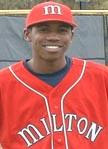 Outfielder eager to improve, find place with team
Outfielder eager to improve, find place with teamBy Tracy Ringolsby, Rocky Mountain News
Originally published 12:45 a.m., March 1, 2008Updated 02:03 a.m., March 1, 2008
Ubaldo Jimenez pitched two innings against the Mexican National All-Stars, allowing no runs and striking out two.
Dexter Fowler could eventually become the Rockies' tribute to Larry Walker.
In the dark days of the franchise, when the Rockies were unloading salary and talking about building a foundation with an emphasis on developing their own talent, the skeptics moaned about the lack of commitment to winning.
Now, the fans are starting realize that it wasn't all corporate speak. There was a method to what at the time seemed like management madness.
For instant gratification, there was last year's late-season surge that resulted in the first National League pennant in franchise history. The key to the plan the Rockies have undertaken isn't last year or this year, though, but the next decade, and that's where the Dexter Fowlers of the world fit in.
Fowler came out of Milton High School in Alpharetta, Ga., back in June 2004 with a list of options that included playing basketball at Harvard or baseball at the University of Miami, Fla., or signing with the Rockies, who gambled and selected him in the 14th round of the baseball draft.
Fowler was, after all, considered a first- or second-round-
caliber prospect. When he didn't go early in the draft, teams shied away because they knew with his options he wasn't going to sign cheap.The gamble paid off for the Rockies, but it took awhile.
caliber prospect. When he didn't go early in the draft, teams shied away because they knew with his options he wasn't going to sign cheap.The gamble paid off for the Rockies, but it took awhile.
Fowler had packed his bags for college. He was three days away from heading to Miami when the Rockies finally agreed to a $925,000 signing bonus and got his name on a contract - 11 days after the Aug. 6, 2004, trade of Walker to St. Louis. The timing was no coincidence. Money saved on Walker's salary for the final two months of that season was allotted for scouting director Bill Schmidt to sign Fowler.
This spring, the Rockies, major league staff and spring training fans are getting an early glimpse of the evolution of the 6-foot-4, 175-pound center fielder with star potential.
He has yet to play a professional game above the Single-A level, but after a cursory look last spring - four at-bats in six games - he has been given significant playing time in the first three days of this exhibition season. That included starting and hitting leadoff in the Rockies' 15-2 victory against the Mexican Nationals team at Hi Corbett Field on Friday.
"I remember watching him on Field 3 (of the minor league complex) in the Instructional League (in 2004) drop three flyballs," manager Clint Hurdle said. "He was just a kid out of high school, learning how to switch-hit. He's starting to put a list of credentials together."
After coming off the bench to go 2-for-2 with three RBI in the Rockies exhibition opener Wednesday, and grounding into a double play and drawing a walk in a bench role Thursday, Fowler provided an early spark for the Rockies on Friday.
He doubled to drive in a run and scored a run in the three-run second that gave the Rockies a 5-0 lead, then he singled, stole a base and scored a run in the fourth. He also showed an ability to glide across the outfield that Hurdle admitted brought back memories of a young Willie Wilson.
There are no unrealistic dreams on Fowler's part. He's headed for Double-A Tulsa when the season opens, the next step in his progression to the big leagues. But he is soaking up every minute of major league camp.
There are no unrealistic dreams on Fowler's part. He's headed for Double-A Tulsa when the season opens, the next step in his progression to the big leagues. But he is soaking up every minute of major league camp.
"I'm blessed to get this chance," Fowler said. "It's all a learning experience. Each day things go on and I become aware of different aspects of the game."
Fowler does pay attention. And he does have motivation to be a success in baseball.
That was evident his senior year in high school. Despite contacts from major universities, including Harvard, about playing basketball in college, he gave up the sport to concentrate on baseball.
That was evident his senior year in high school. Despite contacts from major universities, including Harvard, about playing basketball in college, he gave up the sport to concentrate on baseball.
"I wanted to take my game to the next level," Fowler said.And when he signed in pro ball, despite his high stature, he quickly adjusted to suggestions the Rockies made, including accepting the idea of switch-hitting that first summer with rookie-Casper.
"The important thing was that Dexter dedicated himself to learning how to do it," said P.J. Carey, who was the manager in Casper that year but is now the minor league coordinator with the Dodgers. "It's not easy. You're in pro ball. You want to do well and you are asked to make a drastic change in your game.
"It's a credit to him that not only did he stick to it, but he has had success."
For Fowler, it was a no-brainer.
For Fowler, it was a no-brainer.
"I trust (the Rockies)," he said. "They know better than I do. They've been around the game a long time. I'm just going out and trying to play the game. They just want to help me get better."
So far, the approach has worked just fine.







No comments:
Post a Comment